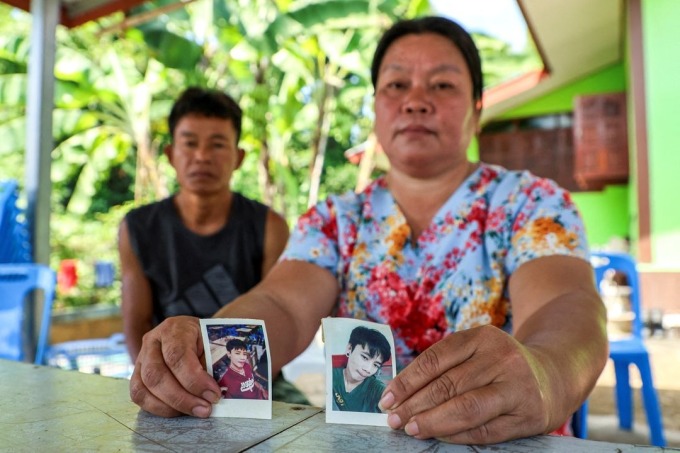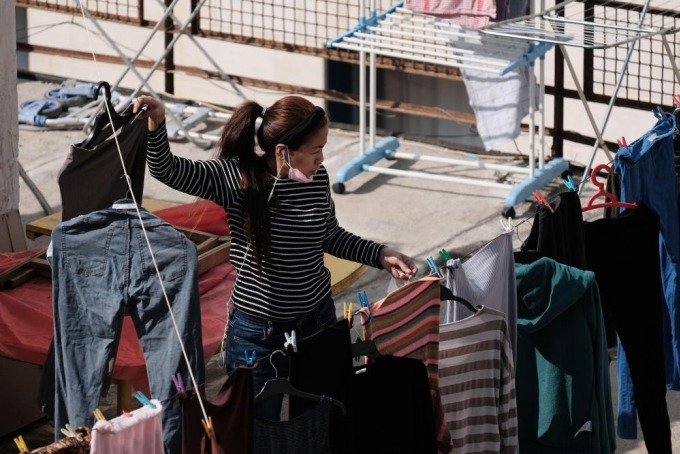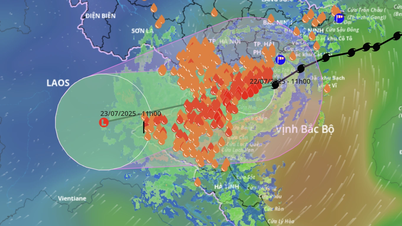Many migrant workers in Israel choose not to return home as tensions escalate, because they have borrowed a lot of money to pay for labor export fees.
At least 50 migrant workers were killed in Israel in a Hamas raid on October 7, including 30 Thais, four Filipinos and 10 Nepalese. There are more than 100,000 foreign workers in Israel, most of them working in nursing, agriculture and construction.
Many are afraid to stay in Israel and want to return home but choose not to. They are burdened with debt to pay for labor export fees, sometimes tens of thousands of dollars. Continuing to work in Israel is the only way for them to pay off their debt.

Thawatchai and Thongkoon On-kaew, the parents of Natthaporn, a Thai national working in Israel who was kidnapped by Hamas, hold up a photo of their son at their home in Nankhon Phanom, Thailand, on October 10. Photo: Reuters
Diana, 33, a Filipino worker, had to hide in a bomb shelter with the 88-year-old man she cared for, while Hamas tried to break in on October 7.
She worked in the settlement of Be'eri, about 5km from the Gaza Strip. Diana survived the Hamas attack but several of her colleagues were killed. "It was terrifying. It felt like the last seconds of my life," Diana said.
She and her grandfather had no food or water for 18 hours until the Israel Defense Forces (IDF) arrived at 2 a.m. Haunted by the attack, Diana did not return home as her family wished.
"We don't have a house yet in our hometown. I plan to work here until I have enough money to build one," she said. "It will take another three years."
The International Labor Organization (ILO), a United Nations agency, requires employers to cover all costs associated with hiring migrant workers from abroad. However, human rights experts have frequently criticized Israel for requiring workers to pay these costs themselves.
Israel is an attractive place for migrant workers because wages are higher than other countries in the region, causing intermediaries to often inflate costs for those who want to export labor.
Labor shortages in Israel's health and agricultural sectors, coupled with the heavy debt that workers carry when they come to work in Israel, can lead to situations where migrant workers are abused and forced to work long hours without rest.

Filipino migrant workers hang laundry on the roof of a building in West Jerusalem, Israel, February 7, 2021. Photo: Guardian
Saket, 29, an Indian, had to borrow money to pay more than $20,000 in brokerage fees to a recruitment agency to go to Israel to work as a nurse last year. Like the Philippines, India is arranging repatriation flights for its citizens, but Saket said she will not return home.
“We worked very hard to get a high-paying job,” he said. Saket was paid $1,500 a month, three times what he earned in Gulf countries like Saudi Arabia or Kuwait.
"The cost of paying a recruitment company to go to Israel is 10 times higher than to go to the Gulf countries. That's why fewer people go to Israel to work. You have to have money to go to Israel," Saket said.
Nicholas McGeehan, co-founding director of FairSquare, a London-based human rights NGO, describes migrant workers as an “invisible and forgotten” segment of Israel.
“In the past, migrant farm workers were forced to continue working when rockets were flying from Gaza,” he said. “In fact, agricultural workers face great risks when they are forced to work during attacks.”
"I hope that the many migrant workers caught up in the October 7 raid will remind Israel that it needs to protect and care for its minorities," McGeehan said.
Hong Hanh (According to Guardian )
Source link







































































































Comment (0)